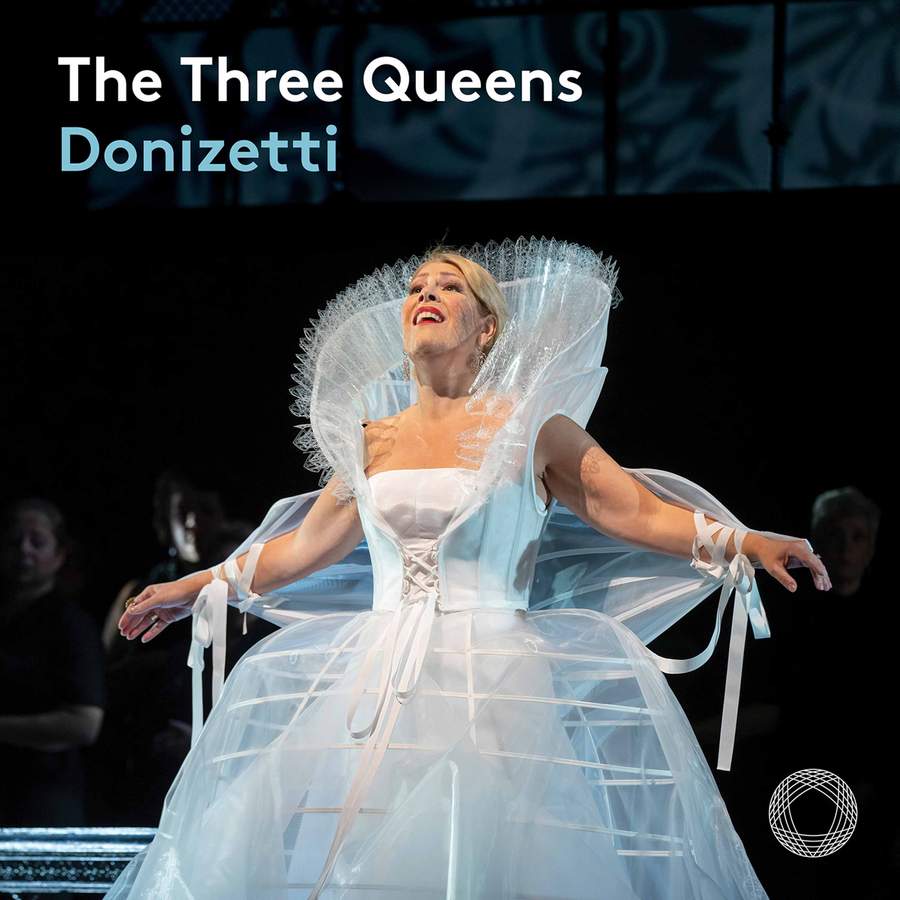DONIZETTI 'The Three Queens'
View record and artist detailsRecord and Artist Details
Genre:
Opera
Label: Pentatone
Magazine Review Date: 06/2022
Media Format: CD or Download
Media Runtime: 100
Mastering:
DDD
Catalogue Number: PTC5186 970

Tracks:
| Composition | Artist Credit |
|---|---|
| Anna Bolena, Movement: Overture |
Gaetano Donizetti, Composer
Chicago Lyric Opera Orchestra Riccardo Frizza, Conductor |
| Anna Bolena, Movement: Act 2, final scene |
Gaetano Donizetti, Composer
Anthony Reed, Bass Chicago Lyric Opera Chorus Chicago Lyric Opera Orchestra Eric Ferring, Tenor Lauren Decker, Contralto Mario Rojas, Tenor Riccardo Frizza, Conductor Sondra Radvanovsky, Soprano |
| Maria Stuarda, Movement: Prelude |
Gaetano Donizetti, Composer
Chicago Lyric Opera Orchestra Riccardo Frizza, Conductor |
| Maria Stuarda, Movement: Act 2, final scene |
Gaetano Donizetti, Composer
Chicago Lyric Opera Chorus Chicago Lyric Opera Orchestra Christopher Kenney, Baritone David Weigl, Bass-baritone Kathleen Felty, Mezzo soprano Mario Rojas, Tenor Ricardo José Rivera, Baritone Riccardo Frizza, Conductor Sondra Radvanovsky, Soprano |
| Roberto Devereux, ossia Il conte di Essex, Movement: Overture |
Gaetano Donizetti, Composer
Chicago Lyric Opera Orchestra Riccardo Frizza, Conductor |
| Roberto Devereux, ossia Il conte di Essex, Movement: Act 3, final scene |
Gaetano Donizetti, Composer
Chicago Lyric Opera Chorus Chicago Lyric Opera Orchestra Eric Ferring, Tenor Kathleen Felty, Mezzo soprano Riccardo Frizza, Conductor Sondra Radvanovsky, Soprano |
Author: Mark Pullinger
Sondra Radvanovsky became the first soprano to sing Donizetti’s three Tudor queens – Anna Bolena, Maria Stuarda and Elisabetta (in Roberto Devereux; she also appears in Il castello di Kenilworth) – at the Metropolitan Opera, earning widespread critical acclaim. They are three taxing roles, which test a singer’s coloratura, strength and stamina. Beverly Sills tackled them all – and confessed that Elisabetta took 10 years off her vocal shelf life – as did Edita Gruberová. And while Maria Callas, Joan Sutherland and Elena Suliotis were notable Anna Bolenas, only Sutherland additionally took on Maria Stuarda.
Riccardo Frizza proposed that Radvanovsky sing the finales of these three operas in concert, at the Lyric Opera of Chicago in December 2019, with each finale preceded by the opera’s overture. This results in nearly 100 minutes of music, requiring two discs for this bumper Tudor queens Pentatone release of those live performances. The idea is not unique, though. Just five months before Radvanovsky’s Chicago concert, Diana Damrau recorded the same three finales – without the overtures, so fitting on to a single disc – for Erato. Damrau has also sung Bolena and Stuarda for Oper Zürich in productions by David Alden, although I note that next season’s Devereux is announced with Inga Kalna as Elisabetta.
Radvanovsky and Damrau are very different singers, though. While Damrau is more in the lyric coloratura Gruberová mould, Radvanovsky’s voice is much larger. She sings roles such as Aida, Tosca and Amelia (Un ballo in maschera). Her soprano has real ‘blade’, cutting through the orchestra and filling an auditorium with ease. Despite the dark timbre, hers is a steely sound and she reminds me here of Callas at her most vibrant, albeit with greater control. She tackles the fiendish coloratura head-on. It’s not the steadiest voice in terms of sustaining a long line, as in Bolena’s ‘Al dolce guidami’, and there are splashes of vinegar in Elisabetta’s ‘Vivi, ingrato’. Bolena’s closing cabaletta, ‘Coppia iniqua’, is not for the faint of heart but Radvanovsky throws herself at it full throttle, not always a comfortable listen. Her cavatinas, often expressing a character’s inner sorrow, are sung with emotion.
I’ve no doubt that it was quite an experience in concert – now touring to different venues around the world – with the action semi-staged and Radvanovsky wearing a succession of dramatic gowns by Rubin Singer. But the effects of three punishing finales one after the other inevitably take their toll. Damrau, taking the safety net of the studio, sounds vocally fresher and attacks the notes more cleanly, but still with plenty of character. Indeed, Damrau’s queens are at their best when most venomous.
Frizza generates vivid playing from the Orchestra of LOC and the supporting roles are effectively cast. The recorded sound is full and resonant, with applause retained, which certainly enhances the atmosphere of what must have been an exciting evening in the theatre.
Discover the world's largest classical music catalogue with Presto Music.

Gramophone Digital Club
- Digital Edition
- Digital Archive
- Reviews Database
- Full website access
From £8.75 / month
Subscribe
Gramophone Full Club
- Print Edition
- Digital Edition
- Digital Archive
- Reviews Database
- Full website access
From £11.00 / month
Subscribe
If you are a library, university or other organisation that would be interested in an institutional subscription to Gramophone please click here for further information.




